How to treat colds quickly and effectively
Although the virus that causes colds is not dangerous, colds make you feel uncomfortable. To treat colds quickly, it is important to detect the disease early. As soon as you suspect that you have a cold, take immediate precautions such as: strengthening vitamin supplements, relieving your throat and removing mucus in the respiratory tract . These measures will equip the body with the ability to cope with colds best and help shorten the stage of the disease. In addition, you also need to relax a lot. Remember not to take antibiotics, because colds are caused by viruses, not by bacteria so antibiotics do not work to treat colds.
Method 1: Treat colds quickly
1. Detect disease early
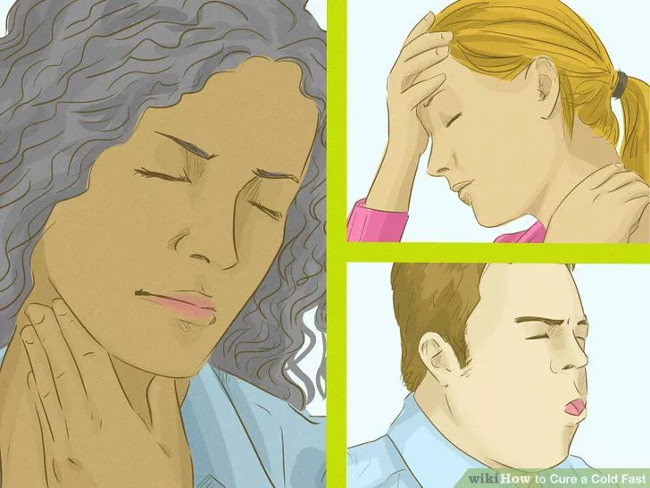
As soon as bacteria enter your body, cold symptoms will immediately appear. Common manifestations of colds include runny nose, throat irritation, cough, congestion, body aches, mild fever and exhaustion . To quickly recover from illness, you need to act quickly because after only the first 12 hours, the cold has progressed strong enough to last more days. So, strengthen your immune system.
2. Use drugs that inhibit cough reactions
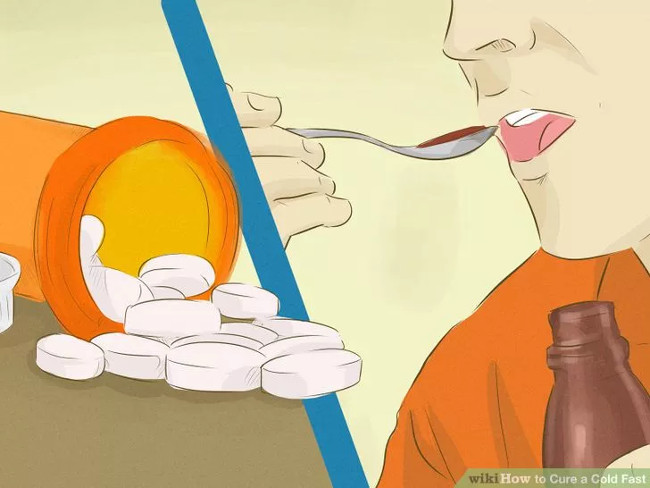
Use cough suppressant when coughing occurs. This drug contains two compounds, dextromethorphan and codeine. Particularly codeine, you need to use the application because this drug can make patients tired and constipated.Dextromethorphan is prepared in two forms: oral tablets and syrups, often used with expectorant. Note that cough suppressants should not be used for coughs that cause " tightness in the chest" and coughing up phlegm, as they are likely to cause infection in the chest cavity. Therefore, talk to your pharmacist about the use of another type of phlegm syrup.
3. Use medicine to treat nasal congestion
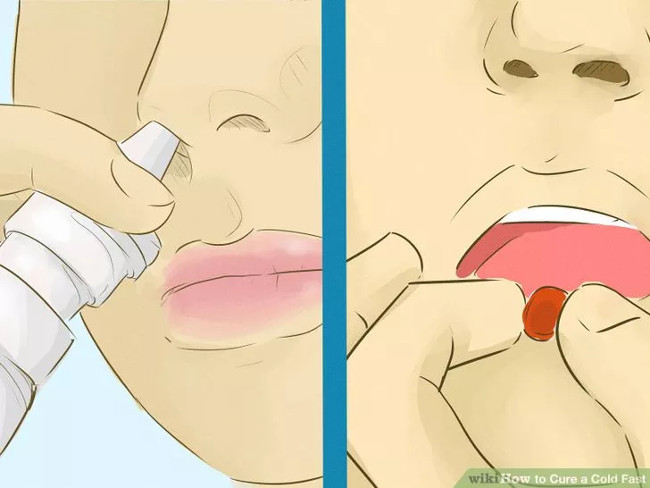
Respiratory blockage medications in two forms: solution and tablet, help blood vessels inside the nasal membrane contract, causing the nasal tube to expand.Phenylephrine (like Sudafed PE) and pseudoephedrine (Sudafed) are two proven nasal decongestants and over-the-counter medicines at drugstores.
- You can use a nasal spray nasal spray at the pharmacy, just spray 1-2 times, you will feel the effect immediately. Decongestant sprays usually contain oxymetazoline, phenylephrine, xylometazoline, or naphazoline, so should only be used if indicated. Moreover, if used more than 3-5 times / day will make your nasal congestion worse.
- Decongestants can make it harder to sleep, dizzy or raise blood pressure. In particular, do not take oral medicine if you have heart disease or high blood pressure. Should be used under the supervision of a doctor if you have diabetes, thyroid disease, increased intraocular pressure and prostate-related disease.
4. Phlegm
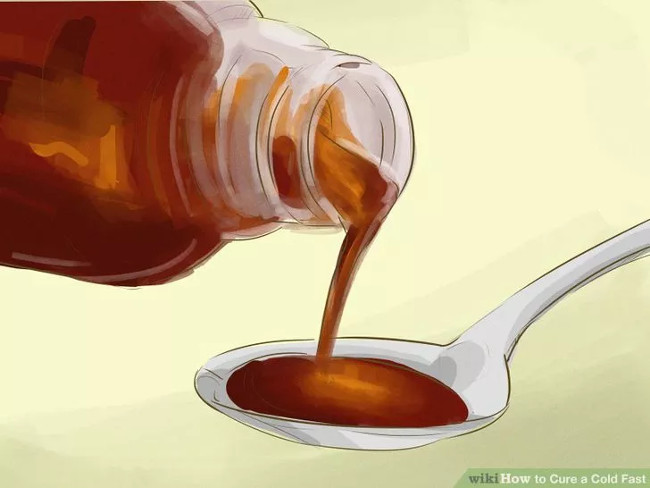
Sputum is also an over-the-counter medicine that helps cleanse your sinuses by diluting mucus and phlegm in the lungs, making it easier to feel and breathe.
- Expectorants are available in pharmacies usually in liquid form, sometimes in the form of tablets and powder. Currently, only one type of over-the-counter sputum excipients is guaifenesin . Look for a drug that contains this excipient and Mucinex is the brand of expectorant containing the most common guaifenesin in today's pharmacies.
- Use caution when using expectorant. Like other drugs, expectorants also have side effects. Among them, the most common is the ability to cause nausea, vomiting and drowsiness. If these symptoms appear, immediately stop using the medication.
5. Add vitamin C
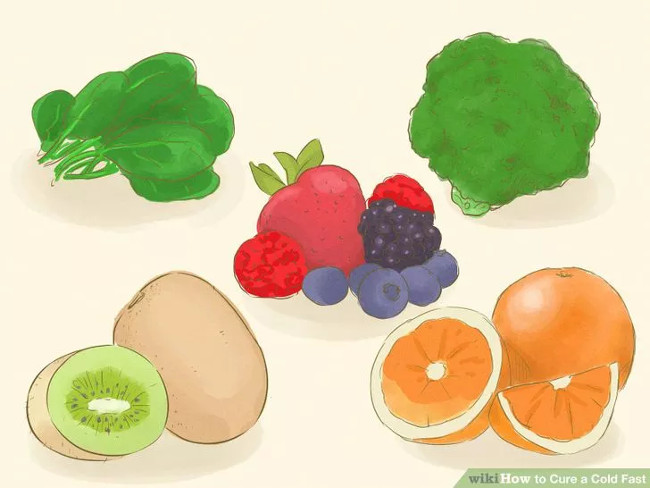
Vitamin C is well known for preventing colds ; moreover, vitamin C has the ability to shorten the stages of the disease.
- Increase vitamin C intake by drinking orange juice and eating vitamin C-rich fruits such as strawberries, kiwi and green leafy vegetables.
- Use vitamin C supplements and tablets. According to the US National Institutes of Health, the appropriate daily dose for men is 90mg and 75mg for women.
6. See a doctor
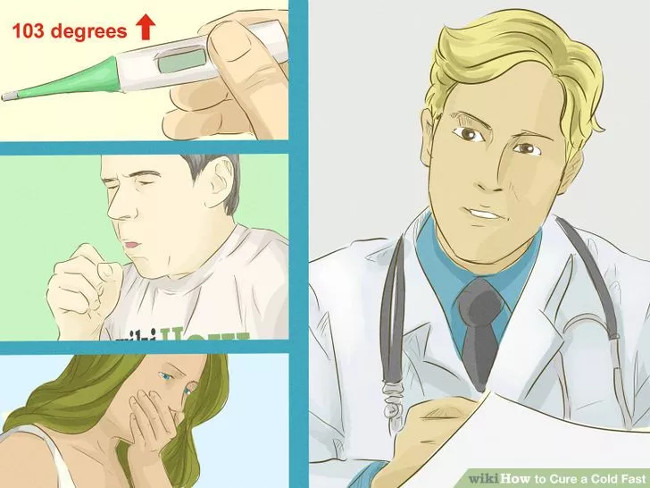
Although your body " wins " almost every cold, your doctor's prescription will help your body shorten symptoms. Of course, do not consult a doctor about antibiotics because they are not effective for symptoms and disease progression. Come to the clinic as soon as the following symptoms appear:
- Ear pain / hearing loss
- Fever over 39 degrees C
- Fever over 38 degrees C and lasts more than 3 days
- Breathe / wheeze
- Blood in sputum
- The general symptoms last more than 7 to 10 days
- Sore throat with fever, no cough, no runny nose. This may be a symptom of throat strep throat, so it should be treated promptly with antibiotics to prevent complications to the heart.
- Cough with fever, no runny nose, no throat irritation. These may be signs of pneumonia, and should be combined with antibiotics for treatment.
Method 2: Treat nasal congestion
1. Blow your nose properly

Blowing your nose is a natural reaction when you feel your nose is stuffy, breathless. However, there should be no restrictions on blowing your nose too much. Although blowing your nose helps you get rid of the mucus that is trapped inside the airways, if you blow your nose too hard or too often it will be counterproductive.
- In fact, some experts claim that blowing the nose puts pressure on the chest because the mucus is stuck, there is a risk of causing more damage to the respiratory tract. To avoid injury, you should only blow your nose when necessary and blow your nose properly.
- Properly blowing your nose is using a finger to cover a nostril and gently exhale with the other nostril to push the mucus out of the nostril. Repeat the same with the other side. Be sure to wash your hands thoroughly with antibacterial soap before touching the nose to avoid spreading the bacteria.
- Avoid irritation by blowing your nose too much by using a soft handkerchief or using petroleum jelly (petroleum jelly) to moisturize and lubricate your nose.
2. Use an extra nasal sinus wash solution or salt water to clean your nose
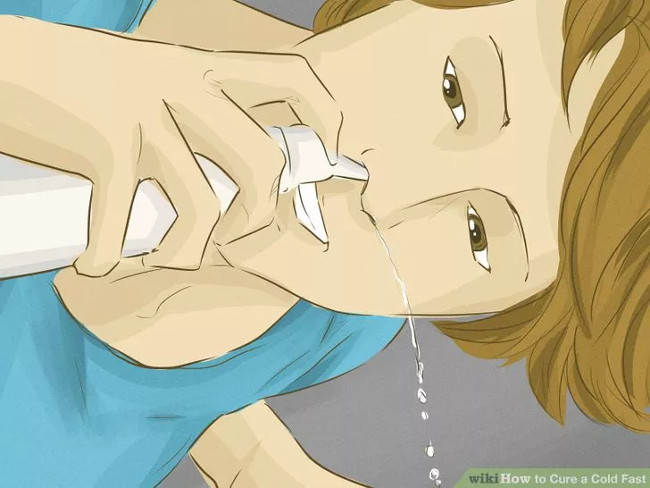
Use a bottle or any container with a small hose to drip salt water into your nose.
- Prepare a saline solution: add half a teaspoon of refined salt to a glass of water and stir until the salt dissolves completely.
- Pour salt water into the container, tilt your neck up and tilt it to one side (carry over the sink), bring the hose into the nostril and pump the saline solution into it. Wait for the salt water to flow deep into the nostril before you move to the other nostril. When salt water has entered the nose, gently blow your nose and repeat with the other nostril.
3. Use hot steam
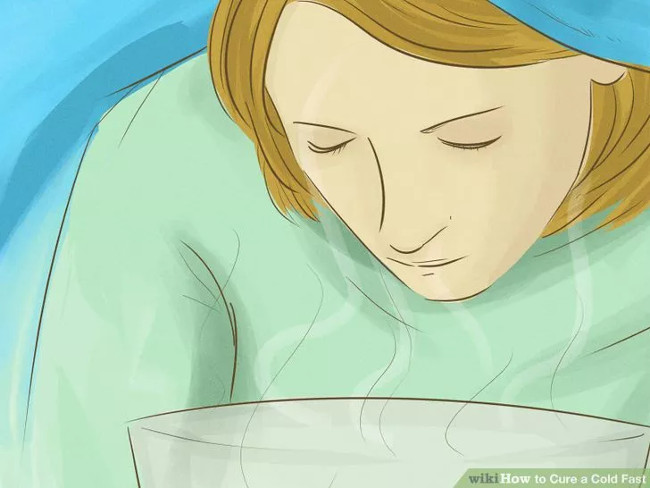
Hot steam is effective in clearing the pipes in your head. The temperature from the steam causes the mucus to dilute, increasing the amount of moisturizing water for the dry air. Here's how to use hot steam to clear the nose:
- Boil water and use steam directly on the face (be careful not to burn the steam): Pour the boiled water into a bowl, bow your face down to the hot water, cover the head with a towel so that the steam does not radiate out. . Then add a few drops of essential oil to clean your sinuses (such as eczema or peppermint) to amplify your ability to clear your sinuses.
4. Hot bath

No matter how uncomfortable the weather is, you should bathe regularly because it is an effective way to help you get rid of a cold quickly. Turn on hot water to high temperatures but still feel comfortable, so the bathroom is filled with hot steam. If the heat makes you feel dizzy, tired, bring a plastic chair or stool.
- Hot water baths also have a miraculous effect on colds - not only for the treatment of nasal congestion, hot steam also warms and helps the body relax. Note the water bath as warm as possible. If you wash your hair before bathing, dry your hair after bathing (whether bathing or showering), because damp hair will lower your body temperature, not good for your body when you have a cold.
5. Use hot drinks
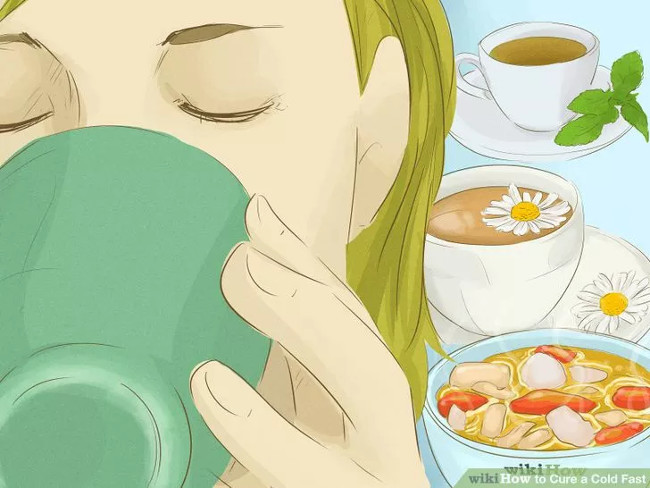
A cup of warm water can help you feel better when you have a cold. Moreover, warm drinks also help to clear airways and soothe a sore throat.
- Use herbal teas such as camomile tea and mint tea, not only calming but also rehydrating. Regular teas and coffees can also help you feel better but don't have good rehydration.
- A simple but effective folk remedy is warm honey lemon juice. Warm water is used to clear the airways, lemons help strengthen the immune system and honey soothes the throat. In addition, the preparation is very simple, just mix one cup of warm lemon juice and add honey to drink.
- Chicken soup is a long-term choice for cold patients, not only because chicken soup is easy to eat and makes people feel comfortable. Science also finds evidence that chicken soup has the ability to limit the body's production of a type of white blood cell that contributes to the symptoms of colds.
Method 3: Rest
1. Spend a lot of rest time
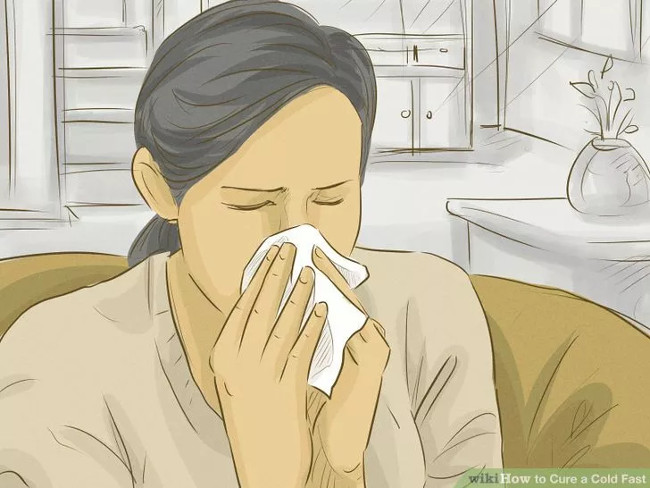
An effective way to stop a cold that lasts for days, even weeks, is to stop maintaining your normal schedule so your body can recover. Take a few days off, find a warm and comfortable place for your body to recover.
- Even if you don't want to delay your work, think of your colleagues, they don't want you to bring germs to the office!
- In addition, cold-causing bacteria attack and weaken the immune system, making you more susceptible to other illnesses or making your current cold worse. So, home is the safest place for you, stay home at least until you feel better.
2. A lot of breaks
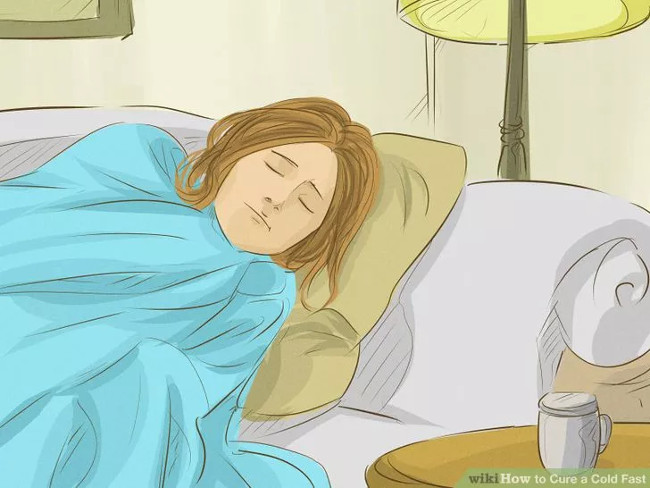
Note that your body has tried its best to resist the bacteria and it needs more energy to overcome the disease. Things like: hunching on housework, playing sports, traveling and other physical activities will make the cold and body condition worse. Be sure to sleep for 8 hours at night and sleep a lot during the day.
- If you can't sleep, just lean back on the couch, cover the blanket and use a warm drink, take advantage of the time to watch TV or read the whole Harry Potter series.
- When sleeping, put your head higher by inserting a pillow underneath. You may feel strange if you are not used to sleeping like that, raising your head will cause mucus to flow back into the nose. If this posture makes you really uncomfortable, insert a pillow under the mat or mattress, you will be more comfortable.
3. Keep your body warm
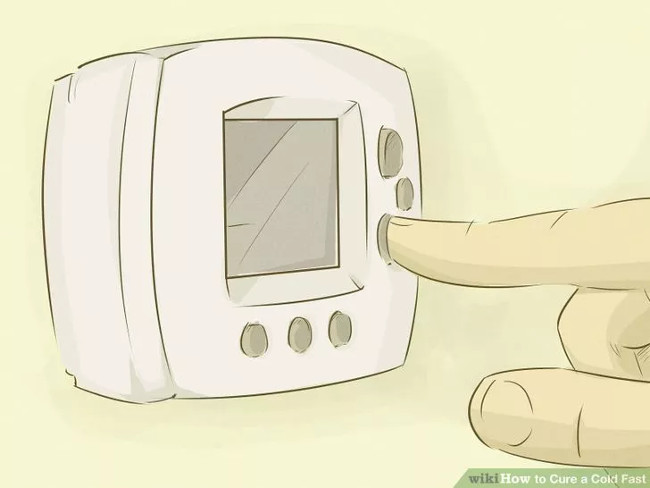
What is the opposite of cold? It is warm! Although cold weather or " a shudder " is not the culprit that causes illness ( but a cold virus ), you still need to keep your body warm during recovery. So turn on the air conditioner and blanket when you go to sleep - you'll quickly feel better.
- However, dry temperatures irritate the inflamed airways and throat pain. So to avoid this situation, you can use a humidifier to add steam to the indoor air that will help you breathe more easily.
- Care should be taken because humidifiers can spread pathogens and mold spores.
4. Drink plenty of water
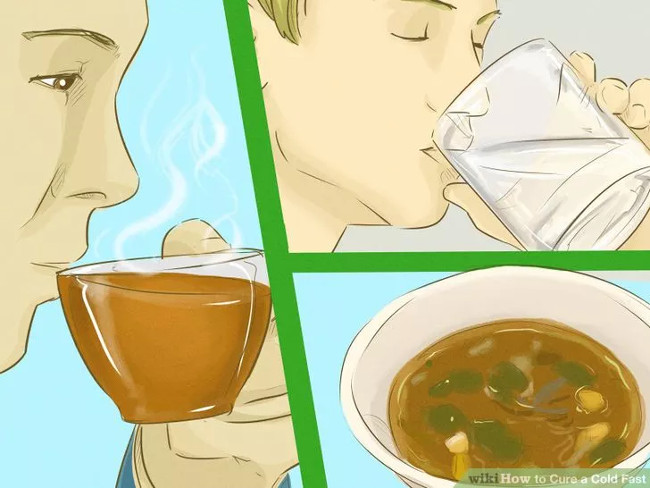
Blowing your nose and sweating for too long in your blanket will cause you to become dehydrated, causing cold symptoms to become more serious, causing headaches, dryness and throat irritation.
- When you are sick, try to add more water than usual by drinking hot tea, eating soup, eating succulent fruits and vegetables (such as watermelon, tomatoes, cucumber, pineapple) and drinking water.
- To know if the body is lacking in water, there is a way to manually check for urine. If your urine is light or transparent, you don't have any problems. But if the urine is dark or cloudy, it is because your body's waste is not completely dissolved and you need to drink more water.
Method 4: Handle other symptoms
1. Use antipyretics / analgesics
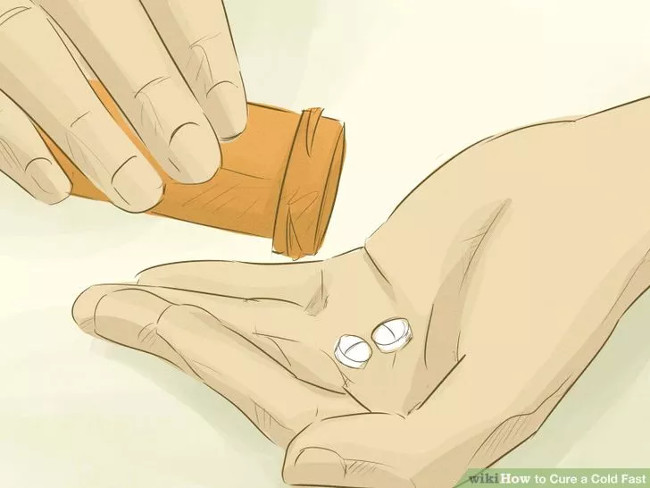
If there are signs of body ache and high fever, there are usually two options for you, including acetaminophen (Tylenol) and NSAIDs (non-steroidal anti-inflammatory drugs like aspirin, ibuprofen and naproxen). In particular, do not take NSAIDs if you have acid reflux or stomach ulcers. If you are taking NSAID drugs to treat other conditions, talk to your doctor if you want to take extra. Do not exceed the dosage listed in the prescription or print on the package. Large doses of the two drugs can be toxic to the liver. You won't want another situation to get worse while trying to cure the current situation, right?
2. Rinse your throat with salt water when you have a sore throat
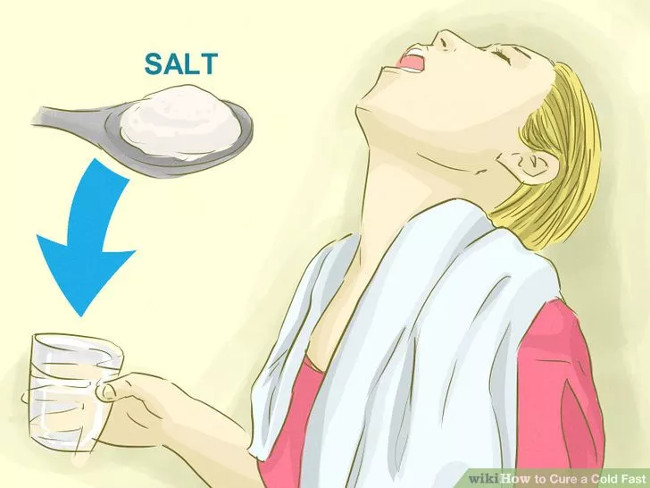
Nasal congestion is not the only unpleasant symptom of a cold. Sore throat, dry throat and throat irritation also cause similar discomfort. So the natural simple way to deal with this problem is to rinse your throat with salt water. Water will soothe the throat while salt - an antiseptic that kills infections. To prepare the solution, dissolve a teaspoon of salt in a glass of water (if the solution is too salty, some baking soda can soften the salty taste). Rinse your throat with this solution about 4 times a day and remember not to swallow.
3. Syrup from elderberry
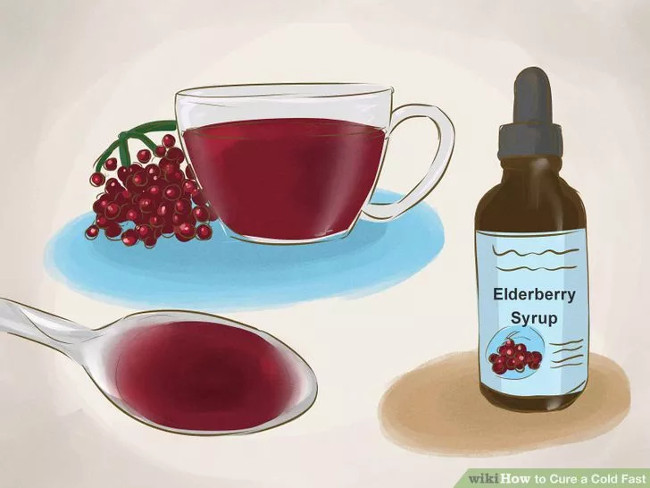
Elder rice is famous for its immune system enhancement, so many people use elderberry to cure colds. In elderberry, there are flavonoid compounds with anti-oxidation and protecting cells from injury, but only a few studies have been done on humans so researchers have not yet There are conclusions about the true effect of elderberry. You can prepare elderberry in the following ways:
- Use a spoon of burnt syrup every morning. This type of syrup is available at pharmacies.
- Add a few drops of elderberry essence (bought at grocery stores) to drinking water or juice.
- Incubate tea - use elderberry and mint leaves to make tea.
4. Use pure honey
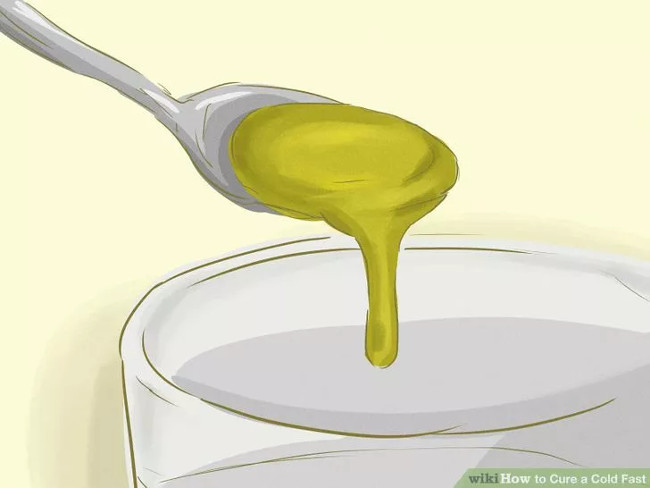
Pure honey is also an immune system remedy, it contains antiviral agents and soothes throat irritation so it is always present in natural cold remedies.
- Can be eaten directly or mixed in warm water or warm tea. An effective cold remedy is to mix a spoonful of turmeric into a glass of milk and add a spoonful of honey. It is recommended to use locally grown honey to build a healthy immune system.
5. Eat garlic
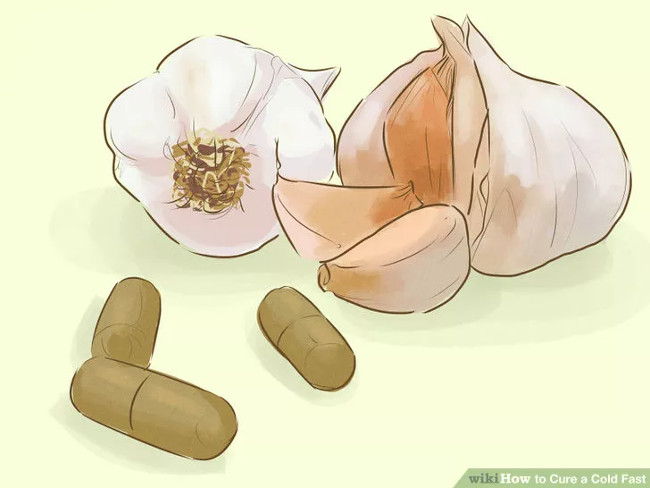
Garlic has many great uses for health because it contains antimicrobials, antiseptics and antibiotics. Some evidence proves that raw garlic is able to cure the symptoms of colds, shorten the time of disease development and enhance the immune system, helping the body avoid recurring disease. effective garlic without medication]
- You can add garlic to dishes and drinks but it's best to eat raw. Crush one clove of garlic to room temperature for about 15 minutes to produce allicin compound (extremely strong antimicin and the best use of garlic).
- Garlic can be eaten directly (if the stomach is healthy) or mixed in a mixture of honey or olive oil and sandwiched with biscuits served.
6. Use natural functional foods
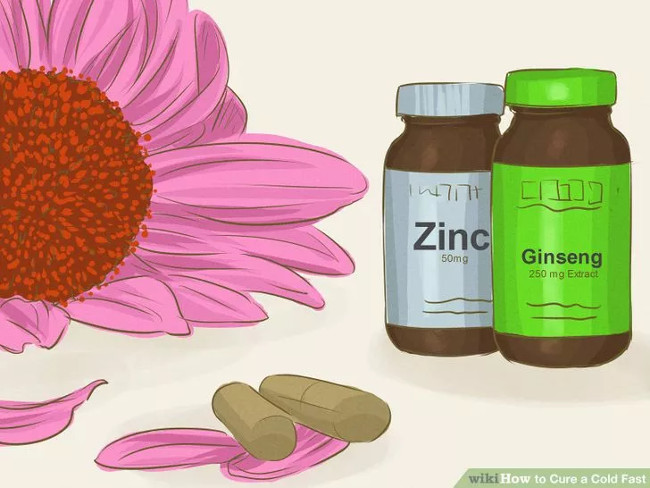
There are some natural foods that are thought to be able to treat cold symptoms. However, these substances do not necessarily " heal " the symptoms immediately but can help symptoms quickly disappear.
- Wild daisy is a herb that is thought to have antiviral effects to treat respiratory infections. Tablets made from this herb are able to shorten the duration of the disease, if you take the medicine as soon as the disease has just developed.
- Zinc has been shown to be able to shorten the duration of colds by inhibiting the reproduction of pathogenic viruses. Currently, zinc is prepared in the form of tablets, lozenges and syrups.
- Ginseng is an ancient medicine that is scientifically proven to shorten the duration of colds, while improving the immune system. Ginseng is prepared into oral form, or you can boil ginseng roots and use as tea.
Refer to some more articles:
- How to recognize, prevent and treat flu by natural methods
- 10 dangerous things will happen to your body if you sit all day
- 12 healthy habits but extremely harmful to health
Having fun!